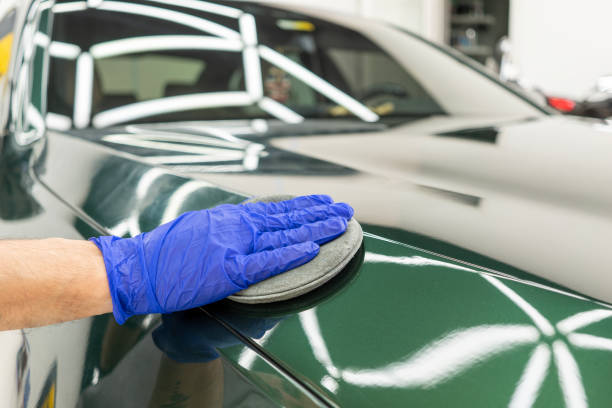In an era where environmental consciousness is at the forefront of our decision-making processes, even seemingly routine tasks such as car maintenance play a crucial role. One often overlooked aspect is the choice of car waxing products. While a gleaming car finish is undoubtedly satisfying, the environmental impact of traditional waxing products cannot be ignored. This article delves into the environmental benefits of opting for eco-friendly car waxing products, shedding light on how this seemingly small choice can contribute to a more sustainable future.
1. Reduced Chemical Footprint
Traditional car wax products often contain a cocktail of chemicals that not only enhance shine but also introduce harmful substances into the environment. These chemicals, including petroleum distillates and synthetic polymers, contribute to air and water pollution. On the contrary, eco-friendly car waxing products are formulated with natural ingredients that minimize the release of harmful substances, ensuring a reduced chemical footprint.
2. Biodegradability Matters
One of the hallmarks of eco-friendly car waxing products is their biodegradability. Conventional waxes may linger in the environment for extended periods, releasing toxins as they break down. Eco-friendly alternatives, however, are designed to degrade naturally without leaving harmful residues, thus safeguarding ecosystems and water sources.
3. Sustainable Raw Materials
The production of traditional car wax often involves the extraction and processing of non-renewable resources, contributing to environmental degradation. Eco-friendly options, on the other hand, prioritize sustainable raw materials. This includes plant-based waxes, natural oils, and other renewable resources that reduce the overall environmental impact of the manufacturing process.
4. Energy-Efficient Production
Eco-friendly car wax manufacturers often embrace energy-efficient production methods. By incorporating renewable energy sources and optimizing manufacturing processes, these products help reduce the overall carbon footprint associated with their production. This commitment to energy efficiency is a crucial aspect of promoting sustainability in the automotive care industry.
5. Ozone-Friendly Formulas
Traditional car wax products may contain ozone-depleting substances, contributing to the deterioration of the Earth’s ozone layer. Eco-friendly alternatives prioritize ozone-friendly formulas, ensuring that their use does not exacerbate the depletion of this vital protective layer. This consideration is a step toward mitigating the long-term environmental impact of car maintenance practices.
6. Water Conservation
Water is a precious resource, and the excessive use of water in car washing and waxing contributes to environmental strain. Eco-friendly car waxing products often require less water for application and removal, promoting water conservation. This reduction in water usage not only benefits the environment directly but also aligns with broader efforts to address water scarcity.
7. Non-Toxic to Wildlife
Conventional car wax runoff, with its chemical-laden composition, can pose a threat to wildlife when it enters natural water bodies. Eco-friendly alternatives, formulated with non-toxic ingredients, minimize this risk. By choosing products that are safe for aquatic life, consumers can contribute to preserving ecosystems and protecting the diverse flora and fauna that depend on clean water sources.
8. Prolonged Vehicle Lifespan
The use of eco-friendly car waxing products contributes to the preservation of a vehicle’s exterior over the long term. By protecting against UV rays, oxidation, and environmental contaminants, these products reduce the frequency of car waxing and detailing. This not only saves resources but also extends the lifespan of vehicles, ultimately reducing the environmental impact associated with manufacturing and disposing of automobiles.
9. Community and Workplace Health
Eco-friendly car waxing products are not only beneficial for the environment but also promote healthier living and working conditions. The reduced use of harmful chemicals in these products contributes to cleaner air and minimizes exposure risks for individuals involved in the application and removal processes. This consideration extends the positive impact of eco-friendly practices beyond the natural environment.
10. Consumer Advocacy for Sustainability
Choosing eco-friendly car waxing products goes beyond personal vehicle maintenance; it sends a powerful message to manufacturers and the automotive care industry. As more consumers prioritize sustainability in their purchasing decisions, manufacturers are compelled to adopt eco-friendly practices, driving positive change across the entire supply chain. This consumer advocacy for sustainability is instrumental in shaping the future of environmentally conscious car care.
Conclusion
The environmental benefits of choosing eco-friendly car waxing products are multifaceted, ranging from reduced chemical footprints to the promotion of sustainable manufacturing practices. As consumers, our choices in seemingly mundane activities like car maintenance can collectively contribute to a healthier planet. By embracing eco-friendly alternatives, we not only protect our vehicles but also play a part in fostering a more sustainable and environmentally friendly future for generations to come.


